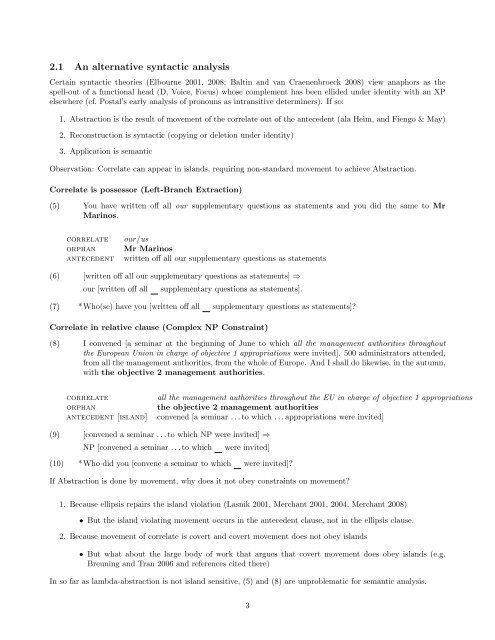handout - Linguistics
handout - Linguistics
handout - Linguistics
You also want an ePaper? Increase the reach of your titles
YUMPU automatically turns print PDFs into web optimized ePapers that Google loves.
2.1 An alternative syntactic analysis<br />
Certain syntactic theories (Elbourne 2001, 2008; Baltin and van Craenenbroeck 2008) view anaphors as the<br />
spell-out of a functional head (D, Voice, Focus) whose complement has been ellided under identity with an XP<br />
elsewhere (cf. Postal’s early analysis of pronouns as intransitive determiners). If so:<br />
1. Abstraction is the result of movement of the correlate out of the antecedent (ala Heim, and Fiengo & May)<br />
2. Reconstruction is syntactic (copying or deletion under identity)<br />
3. Application is semantic<br />
Observation: Correlate can appear in islands, requiring non-standard movement to achieve Abstraction.<br />
Correlate is possessor (Left-Branch Extraction)<br />
(5) You have written off all our supplementary questions as statements and you did the same to Mr<br />
Marinos.<br />
correlate our/us<br />
orphan Mr Marinos<br />
antecedent written off all our supplementary questions as statements<br />
(6) [written off all our supplementary questions as statements] ⇒<br />
our [written off all supplementary questions as statements].<br />
(7) *Who(se) have you [written off all supplementary questions as statements]?<br />
Correlate in relative clause (Complex NP Constraint)<br />
(8) I convened [a seminar at the beginning of June to which all the management authorities throughout<br />
the European Union in charge of objective 1 appropriations were invited]. 500 administrators attended,<br />
from all the management authorities, from the whole of Europe. And I shall do likewise, in the autumn,<br />
with the objective 2 management authorities.<br />
correlate all the management authorities throughout the EU in charge of objective 1 appropriations<br />
orphan the objective 2 management authorities<br />
antecedent [island] convened [a seminar . . . to which . . . appropriations were invited]<br />
(9) [convened a seminar . . . to which NP were invited] ⇒<br />
NP [convened a seminar . . . to which were invited]<br />
(10) *Who did you [convene a seminar to which were invited]?<br />
If Abstraction is done by movement, why does it not obey constraints on movement?<br />
1. Because ellipsis repairs the island violation (Lasnik 2001, Merchant 2001, 2004, Merchant 2008)<br />
• But the island violating movement occurs in the antecedent clause, not in the ellipsis clause.<br />
2. Because movement of correlate is covert and covert movement does not obey islands<br />
• But what about the large body of work that argues that covert movement does obey islands (e.g.<br />
Breuning and Tran 2006 and references cited there)<br />
In so far as lambda-abstraction is not island sensitive, (5) and (8) are unproblematic for semantic analysis.<br />
3

















